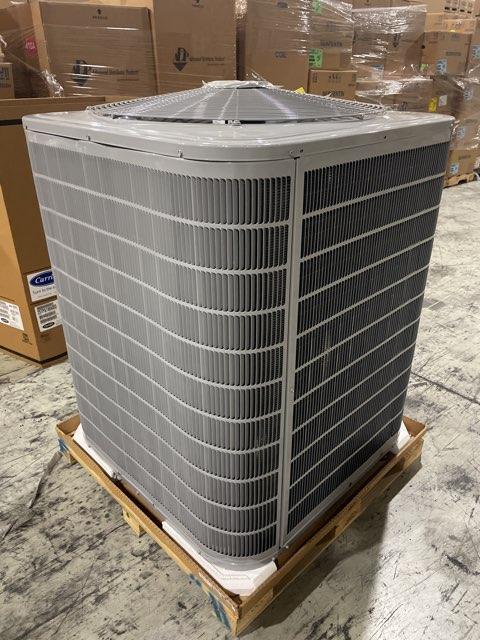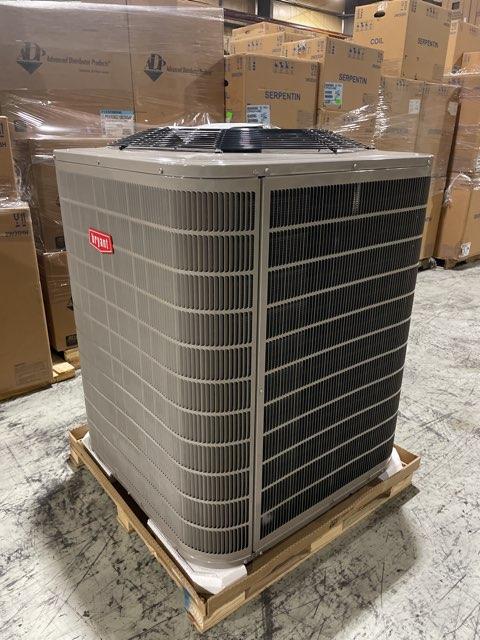Discount Heat Pumps
System Tonnage
Refrigerant Type
Region Approved
Discount Heat Pumps
System Tonnage
Refrigerant Type
Region Approved
-
Vendor: tempstar
4 Ton Single-Stage Split-System Heat Pump 208-230/60/1 R410A 14.3 SEER2
SCL # : 221898 Available: 1Shop NowRegular price $1,649.00Regular priceUnit price / per$2,820.00Sale price $1,649.00Sale -
Vendor: aciq
4 Ton Single-Stage Split-System Heat Pump 208-230/60/1 R410A 14.3 SEER2
SCL # : 221897 Available: 5Shop NowRegular price $1,649.00Regular priceUnit price / per -
Vendor: tempstar
3 Ton Variable Speed Split-System Communicating Compatible Heat Pump 208-230/60/1 R410A 18 SEER
SCL # : 221899 Available: 1Shop NowRegular price $1,429.00Regular priceUnit price / per -
Vendor: day and night
4 Ton Single-Stage Split-System Heat Pump 208-230/60/3 R410A 14 SEER
SCL # : 221896 Available: 3Shop NowRegular price $1,749.00Regular priceUnit price / per$2,820.00Sale price $1,749.00Sale -

 Vendor: ruud/rheem/warren
Vendor: ruud/rheem/warren2 Ton Inverter SS Comm Heat Pump 19 SEER, 2 Ton Comm Multi Air Handler and 7.2 KW Heat W/30A Breaker
SCL # : M000744 Available: 5Shop NowRegular price $2,149.00Regular priceUnit price / per$2,895.00Sale price $2,149.00Sale -

 Vendor: ruud/rheem/warren
Vendor: ruud/rheem/warren2 Ton Inverter SS Comm Heat Pump 19 SEER, 2 Ton Comm Multi Air Handler and 10 KW Heat W/60A Breaker
SCL # : M000743 Available: 5Shop NowRegular price $2,159.00Regular priceUnit price / per$2,895.00Sale price $2,159.00Sale -

 Vendor: ruud/rheem/warren
Vendor: ruud/rheem/warren2 Ton Inverter SS Comm Heat Pump 19 SEER, 2 Ton Comm Multi Air Handler and 5 KW Heat W/30A Breaker
SCL # : M000742 Available: 5Shop NowRegular price $2,109.00Regular priceUnit price / per$2,895.00Sale price $2,109.00Sale -

 Vendor: rheem/ruud
Vendor: rheem/ruud2 Ton Inverter Split-System Comm Heat Pump 19 SEER and 2 Ton AC/HP Comm Multiposition Air Handler
SCL # : M000741 Available: 5Shop NowRegular price $1,999.00Regular priceUnit price / per$2,770.00Sale price $1,999.00Sale -

 Vendor: american standard/trane
Vendor: american standard/trane2 Ton Variable SS Comm Heat Pump 20 SEER and 2.5 Ton AC/HP Multiposition Comm Compatible Air Handler
SCL # : M000738 Available: 2Shop NowRegular price $1,969.00Regular priceUnit price / per$2,256.00Sale price $1,969.00Sale -

 Vendor: maytag/nordyne/warren
Vendor: maytag/nordyne/warren2 Ton Ultra High Eff SS Heat Pump 19 SEER, 2 Ton Var Spd Up/Horz Fancoil, 16 SEER with 8 Kw Heat Kit
SCL # : M000736 Available: 5Shop NowRegular price $2,189.00Regular priceUnit price / per$2,381.00Sale price $2,189.00Sale -

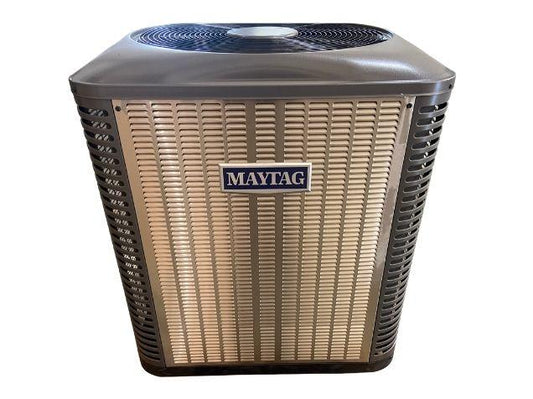 Vendor: maytag/nordyne/warren
Vendor: maytag/nordyne/warren2 Ton Ultra High Eff SS Heat Pump 19 SEER, 2 Ton Var Spd Up/Horz Fancoil 16 SEER, 4.8 Heat W/Breaker
SCL # : M000735 Available: 5Shop NowRegular price $2,159.00Regular priceUnit price / per$2,381.00Sale price $2,159.00Sale -

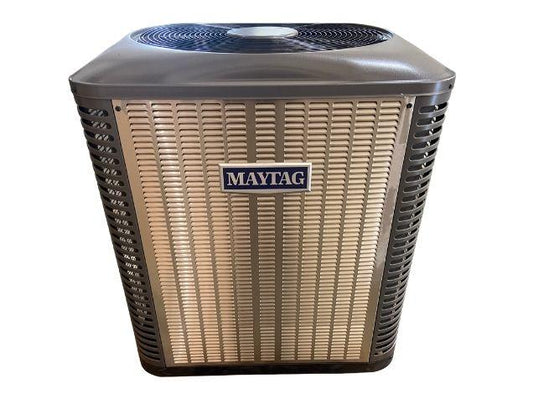 Vendor: maytag/nordyne
Vendor: maytag/nordyne2 Ton Ultra High Eff SS Heat Pump 19 SEER and 2 Ton AC/HP Var Spd Up/Horz Fancoil/Less Heat 16 SEER
SCL # : M000734 Available: 5Shop NowRegular price $2,049.00Regular priceUnit price / per$2,256.00Sale price $2,049.00Sale -

 Vendor: goodman
Vendor: goodman1.5 Ton 1-Stage SS Heat Pump 208-230/60/1 14.3 SEER2 with 2 Ton AC/HP ECM Multiposition Air Handler
SCL # : M000706 Available: 71Shop NowRegular price $1,749.00Regular priceUnit price / per$2,125.00Sale price $1,749.00Sale -
Vendor: carrier
4 Ton Two-Stage Split-System Heat Pump 208-230/60/1 R410A 17 SEER2
SCL # : 221908 Available: 2Shop NowRegular price $1,649.00Regular priceUnit price / per -
Vendor: bryant
4 Ton Two-Stage Split-System Heat Pump 208-230/60/1 R410A 17 SEER2
SCL # : 221906 Available: 2Shop NowRegular price $1,649.00Regular priceUnit price / per -

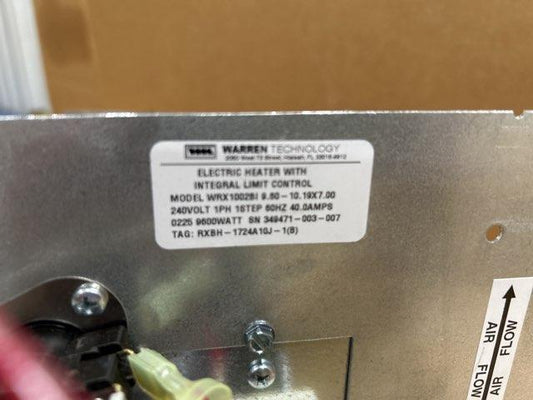 Vendor: rheem/goodman/warren
Vendor: rheem/goodman/warren1.5 Ton 1-Stg HP R410A 14.3 SEER2, 2 Ton AC/HP ECM Multi Air Handler, 10Kw Heat 40A Smart Plug Only
SCL # : M000669 Available: 10Shop NowRegular price $1,959.00Regular priceUnit price / per$2,754.00Sale price $1,959.00Sale -

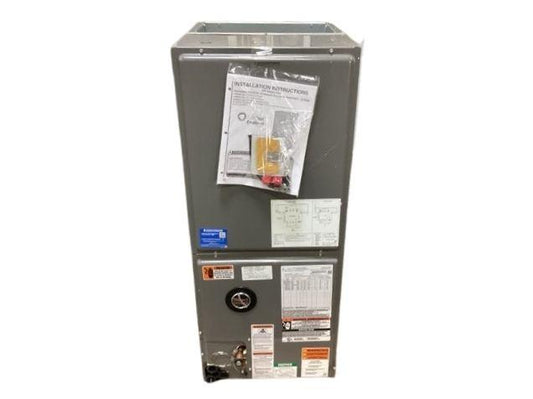 Vendor: rheem/goodman/warren
Vendor: rheem/goodman/warren1.5 Ton 1-Stg HP R410A 14.3 SEER2, 2 Ton AC/HP ECM Multi Air Handler and 7.5Kw Heat 30A Smart Plug
SCL # : M000668 Available: 7Shop NowRegular price $1,949.00Regular priceUnit price / per$2,754.00Sale price $1,949.00Sale -

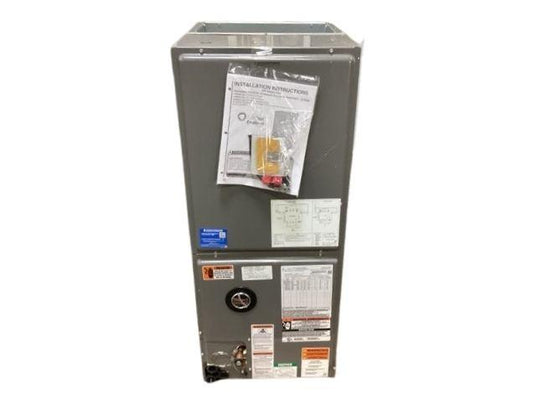 Vendor: rheem/goodman/warren
Vendor: rheem/goodman/warren1.5 Ton 1-Stg HP R410A 14.3 SEER2, 2 Ton AC/HP ECM Multi Air Handler and 5Kw Heat, 20A w/ Smart Plug
SCL # : M000667 Available: 9Shop NowRegular price $1,909.00Regular priceUnit price / per$2,754.00Sale price $1,909.00Sale -

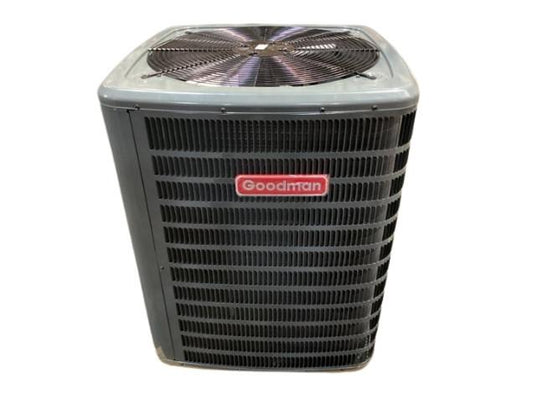 Vendor: goodman/rheem
Vendor: goodman/rheem1.5 Ton 1-Stg Heat Pump 208-230/60/1 R410A 14.3 SEER2 with 2 Ton AC/HP ECM Multiposition Air Handler
SCL # : M000666 Available: 53Shop NowRegular price $1,799.00Regular priceUnit price / per$2,629.00Sale price $1,799.00Sale
Discount AC Heat Pump
When comparing HVAC and AC options, it’s common to worry about your budget since many heat pump systems look pricy at first glance. However, several cheaper options are available that can help you find affordable heating and cooling solutions.
If you’re looking for cheap air conditioners, we have you covered. Let’s review whether a discount AC heat pump is the right choice and how to determine the ideal solution for your needs. Whether you're looking for an air source heat pump, ground source heat pumps, or electric heat pumps, we can help you find the right central heating system.
Is It Cheaper to Run an AC or Heat Pump?
aBefore investing in a heat pump, you’re probably wondering if the cost of operation is really worth it compared to other types of AC systems. In the long term, the answer is usually yes for the average home because heat pumps can save you money on energy bills. Here’s what you should know before buying.
Upfront Costs
In the short term, the upfront investment in a heat pump usually costs more than a traditional air conditioner.
Cheap heat pumps often range between $1,000 and $1,500. In comparison, you can find cheap air conditioners, such as window ACs or portable ACs, for as low as $300 to $600.
If your budget is a bit bigger, mid-range heat pumps typically cost between $3,500 to $7,500, and mid-range AC units are usually around $3,000 to $7,000.
However, the costs can vary depending on your home's size, design, and heating and cooling needs. For example, some homes require ductwork installation for the heat pump to be operational, which could add $3,000 or more in upfront costs. That’s why it’s always best to get a quote from an HVAC professional before deciding on an option.
Additionally, some types of heat pumps are more energy efficient, like geothermal or solar options that use thermal energy, but can cost up to $20,000 or more. While they will save a ton on energy expenses because of the way these heat pumps work, the average home will get away just fine with cheaper heat pumps that are still very energy efficient when they generate heat and cost much less upfront.
Functionality
When comparing AC vs. heat pump costs, functionality is one thing that sets them apart.
Some air conditioners are only designed for cooling, whereas heat pumps can heat and cool a space. Therefore, investing in the heat pump could be the better choice if you’re in a region where you need both functions for hot summers and cold winters.
However, if you live in a warmer climate in the southern U.S., you might do fine with just an air conditioner that cools your space if that’s all you’ll need. In that case, if you find a good deal on a cheap AC unit that only cools, it’s worth considering.
Energy Efficiency Ratings
Heat pumps generally operate more efficiently than traditional air conditioners. A primary reason is they’re electric rather than running on propane or heating oil, which older HVAC systems still use.
The U.S. Department of Energy states that the right heat pump could save you between $300 and $1,500 each year. With the average HVAC system lasting between 10 and 15 years, there could be a potential cost savings of $3,000 to over $20,000 during the unit’s lifespan.
Therefore, while a heat pump might cost extra initially, the potential savings make it well worth it for the average home.
Which Heat Pump System Is the Cheapest to Operate?
When looking into cost-effective heat pumps, it’s common to wonder about long-term expenses.
Generally, the type of heat pump that saves the most on operational costs is the geothermal heat pump. These use stable underground temperatures to create heat and cool homes, which is very energy efficient. They can actually save up to 70% on your energy bills, since they are effective as a cooling system as well as a central heating system in heating mode. However, as mentioned earlier, they cost much more upfront for the unit and installation, going from anywhere between $20,000 and $40,000.
Cheaper Options That Are Still Affordable to Operate
Due to the significant upfront costs of geothermal systems, most people are better off with more affordable options, like air-source heat pumps or ductless mini-split heat pumps.
Ductless mini-split heat pumps have the lowest upfront costs since the installation is very easy. However, they often have some limitations on their overall heating and cooling power. So, you might need to make other adjustments with them, like having a multi-zone system set up with several mini-splits throughout your home to heat or cool your entire space.
Air-source heat pumps are usually the best mid-range option for the average home. The installation is a bit more expensive since they need to attach to heating and cooling ducts, but they’re pretty energy-efficient and offer a good amount of cooling power once they’re set up.
Consider the Unit’s SEER
When looking for affordable heating solutions with reasonable operational expenses, the unit’s SEER (seasonal energy efficiency ratio) rating is a good metric to consider. A good range is between SEER 13 and 20 for a balance of energy efficiency and affordable units. Units with a SEER of more than 20 are the most efficient but cost a lot upfront.
What Is the Downside of a Heat Pump?
Like any HVAC equipment or product, some heat pump disadvantages and potential issues could arise when you choose this option. Let’s review the potential cons of heat pumps to help you make an educated decision.
- Initial installation costs: Depending on the type of heat pump you choose, installation can be more expensive than traditional HVAC systems. For instance, modifications to existing ductwork might be needed to ensure it works correctly, adding costs. However, the energy savings from heat pumps can help offset this over time.
- Performance in extreme cold: Heat pumps extract and transfer heat from the air to manage temperatures in your home. However, in below-zero temperatures, they’ll struggle to extract heat from the outside air and push it into your home. In these instances, they might need modifications like adding a supplemental heating source or attaching them to a gas furnace to work correctly.
- Noise levels: Heat pumps are generally quieter than traditional HVAC systems. However, they still make noticeable noise when they’re running, especially from the outdoor portion of the unit. So, it is a consideration for those who want to manage the noise levels in their space.
- Maintenance requirements: Since heat pumps run year-round for heating and cooling, they will experience more wear and tear than traditional furnaces or air conditioners. Regular maintenance is important to keep them running well.
Is It Worth Replacing an AC with a Heat Pump?
In some cases, replacing an AC with a heat pump can be worth it. However, there are upgrade considerations, and you must weigh the pros and cons to determine if it’s right for your situation.
In the short term, replacing an existing AC system with a similar model will usually have lower upfront costs. It’s much easier and cheaper for HVAC teams to install new units when they don’t have to modify your air ducts to make them work. However, there are still options like a ductless mini-split heat pump system to make this process more affordable in the short term.
One of the primary replacement benefits of switching from an AC to a heat pump is that it will future-proof your home and lower long-term operating expenses.
More HVAC systems are moving toward fuel-free electric options, so opting for a heat pump will give you a lot more options and alternatives down the road. Plus, these systems are very energy efficient and good for the environment, which will save money on energy bills, offsetting many of the upfront installation costs.
Additionally, if you have an AC unit that only provides cooling for your home, many people find it worth transitioning to a heat pump that provides heating and cooling in one unit.
Conclusion
In summary, buying a heat pump can be a worthwhile investment, but it has pros and cons. Here are some final thoughts and recommendations to help you determine if it’s right for you:
- Consider your current budget. Depending on your home's size, layout, and current HVAC system, upgrading to a heat pump system could have some significant upfront costs. While a heat pump will save on energy expenses in the long term, it’s always best to avoid spending money you don’t have right now.
- Look for discount AC heat pumps that will lower initial expenses. Several options, like discount retailers and seasonal sales, can make the transition easier for you to manage financially.
- Review different types of heat pumps. There are many options on the market, such as mini-split systems, air-source systems, and geothermal heat pumps. These various types of units give you options for your budget and home, making it easier to find one that’s right for you.
Find Discount AC Heat Pumps at Surplus City Liquidators
When you need a discount AC Heat Pump to replace existing parts or upgrade your HVAC system, Surplus City Liquidators has you covered. We buy in bulk from manufacturers and negotiate deals to pass the savings on to you. That means you can find some of the lowest prices on top brands when you shop with us.
You can shop, compare prices, and get units shipped straight to your doorstep through our convenient online store. Otherwise, stop in at one of our showrooms in Indiana, Texas, or Florida to see our inventory in person. Whichever route you take, we’re here to help you make an educated decision that provides the best heating and cooling experience.
Start shopping now, or contact us with any other questions.





































